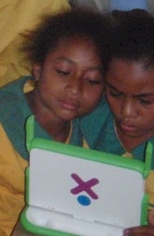OLPC Oceania
Cook Islands -French Polynesia - Kiribati - Nauru - New Caledonia - Niue - Palau - Papua New Guinea - Samoa- Solomon Islands - Tonga - Tokelau - Tuvalu - Vanuatu
OLPC Oceania describes OLPC activities in the Islands of the Pacific excluding New Zealand and Australia. Ethnologically the region includes sub-regions of Melanesia, Micronesia and Polynesia. Geographically it includes thousands of coral atolls and volcanic islands with small populations, grouped in 26 island nations.
OLPC activities in the region are coordinated by the Secretariat of the Pacific Community (SPC), with Dr Jimmie Rodgers as Director-General, with additional guidance from members of the Pacific Islands Forum Secretariat (PIFS), with Mr John Budden as executive secretary.
Current activity in the region includes implementation of a satellite-based Pacific Rural Internet Connectivity System (Pacific RICS) consisting of low-cost VSAT satellite broadband Internet that will provide a broad infrastructure to accomodate large-scale OLPC rollout. This initiative, launched at the 2007 Forum Leaders meeting in Tonga responds to a call by Leaders in the Pacific Plan Digital Strategy to bridge the digital and communication divide between the urban and rural and remote areas in the Pacific. Initial funding came from the Australian Government, however for its usefulness to be realized in the region's rural and remote communities, Pacific Island countries need to invest in roll-out programs at national levels. The RICs together with the Oceania OLPC initiative is a package for rural and remote areas in the Pacific, addressing both the transport of information as well as the content - 'Every RICS site is an OLPC Hub'.
Initial countries include Solomon Islands, Tonga, Kiribati, Vanuatu and Papua New Guinea. It is expected that other countries will participate later in the year.
To view the current status of progress within a leading site see the Solomon Islands or Papua New Guinea pages.
Participating countries
Trial deployments have started, or as of June 2008 are in preparation at the following countries:
Other contacts
Coordinating contact for the Wiki (until others have caught up with me!)
- David Leeming, Technical Advisor, People First Network, Solomon Islands ; & Oceania OLPC Coorinator, SPC
The following people have also been instrumental in the evolution of this project:
- Dr Jimmie Rodgers, Director General, Secretariat of the Pacific Community (SPC)
- Dr Barry Vercoe, OLPC Asia-Pacific Liaison
- Ian Thomson, RICS Coordinator, SPC
- Sam Taufao, IT Manager, SPC
- Rangan Srikhanta, Executive Director OLPC Australia
- John Budden, Economic Infrastructure Advisor, Pacific Islands Forum Secretariat
- Technical Working Group let by Dr Robert Whelan, University of the South Pacific (USP)
Strategy
The team is working on all of the overarching strategies below. At the moment we are in a learning phase - the Oceania top-level strategy will be informed from out experience in the 8-country trials above. Each country will have to develop local interpretations of these strategies. Meanwhile, we hope to post information on our approach in the areas below, in the relevant country pages of this category.
- Content
- Evaluation
- Distribution
- Training
- Scaling up
- Connectivity
- Communities and volunteers
Documents and Resources
- Agenda and Briefing handout for meeting with the Ministry of Education, PNG, June 12th 2008. This contains useful summaries and can be adapted for similar meetings.
Document formats are ODT (use Open Office) or PDF.
